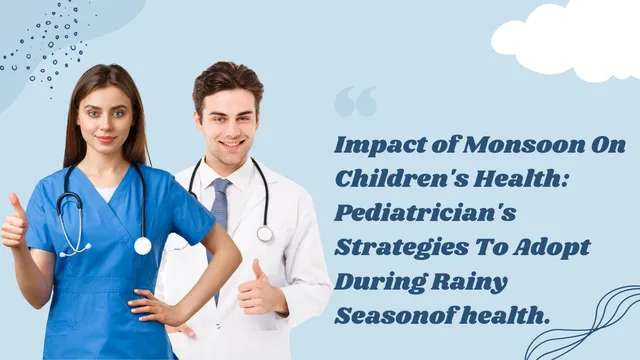- By Priyanka Munshi
- Tue, 09 Jul 2024 06:12 PM (IST)
- Source:JND
Understanding how the monsoon season affects children's health is crucial, as it has both advantages and disadvantages. While the rains benefit crops and replenish water resources, they can also create unfavorable conditions that harm health, particularly in young children. Increased humidity and stagnant water can lead to higher risks of infections like malaria and dengue fever due to mosquito breeding.
Contaminated water supplies also contribute to the rise of waterborne infections such as cholera, typhoid, and diarrhea. Children, with their still-developing immune systems, are especially susceptible to these diseases. Additionally, the wet weather can exacerbate asthma attacks and cause fungal infections.
Parents can take preventive actions by using mosquito nets, ensuring clean water, and practicing good hygiene. Being aware of these hazards can also encourage prompt medical attention, reducing the severity of illnesses. By recogniSing and addressing the health risks of the monsoon, we can better safeguard children's health during this season.
In a conversation with Jagran English, Dr. Vigneswari Raja, MBBS, DCH, and DNB (pediatrics), a consultant pediatrician and neonatologist at Rainbow Children's Hospital in Sholinganallur, Chennai, discussed the impact of the monsoon on children's health and the strategies to adopt during the rainy season.
As the monsoon season unfolds, the refreshing showers bring relief from the scorching heat but also present numerous health challenges, especially for children. Stagnant water, contaminated food, and water become potent threats, leading to a surge in illnesses such as gastroenteritis, cholera, typhoid, malaria, dengue, and various respiratory infections. Safeguarding children's health amidst these risks becomes paramount for parents. By adopting a few straightforward precautions, it is possible to mitigate these concerns and ensure that children not only enjoy the rainy season but also stay healthy.
Common Diseases During The Monsoon:
Cough, Cold, And Viral Fever: The common cold is caused by viruses that thrive in humid environments, leading to symptoms such as fever, cough, nasal congestion, and body aches. Treatment typically involves medications like paracetamol to reduce fever and alleviate discomfort. Drinking warm fluids can also provide relief. Children prone to allergies or asthma may experience exacerbated symptoms such as coughing, shortness of breath, or wheezing during this time. It is important to consult a healthcare provider for preventive anti-allergic medications to manage these conditions effectively.
Gastroenteritis: Gastroenteritis is often caused by the contamination of food or water. Symptoms typically include fever, vomiting, diarrhea, and a reluctance to eat. Many of these illnesses are viral and typically resolve on their own with supportive care, such as oral rehydration therapy to replace fluids and electrolytes and antiemetic medications to alleviate vomiting. In severe cases, intravenous fluids and antibiotics may be necessary. It's crucial to seek prompt medical help if the child appears lethargic, has difficulty consuming fluids, experiences persistent vomiting, or shows reduced urine output.
Typhoid: Typhoid spreads through consuming contaminated food or water. Symptoms include irregular fever, malaise, body aches, stomach pain, loose stools or constipation, and encephalitis. It is a life-threatening infection that requires proper medical care.
Jaundice: This viral liver infection spreads through contaminated water, causing the yellowing of urine and eyes.
Dengue: Dengue is transmitted by mosquito bites. Symptoms include fever, abdominal pain, persistent vomiting, rashes, and decreased urine output. Complications occur during the afebrile period and need emergent medical attention. Avoid stagnant water around houses in sinks, buckets, empty cups, coconut shells, etc.
Malaria: Malaria is transmitted by mosquitoes breeding in stagnant water. Symptoms include a severe fever, with chills occurring regularly. Consult a doctor promptly if symptoms appear, and keep doors and windows shut during the morning and evening to prevent mosquito entry.
Skin Problems: Monsoons often exacerbate skin infections, including bacterial and fungal infections in areas like armpits, groins, and between toes.
Preventive Measures:
Maintain A Healthy Diet: Provide a balanced diet rich in fruits, vegetables (thoroughly washed), and nutrients like vitamins A, E, C, B-complex, antioxidants, and minerals.
Avoid Raw Foods: minimize consumption of raw foods like salads and street-side uncooked foods.
Hydration: Encourage drinking plenty of fluids, including hot vegetable soup or herbal tea, and clean, boiled, or filtered water.
Drinking Water Source: Use properly boiled, cooled water for drinking.
Hand Hygiene: Emphasize regular hand washing, especially before eating and after using washrooms, to prevent the spread of germs and bacteria.
Use Waterproof Rain Gear: Ensure children always wear an umbrella or raincoat and waterproof shoes to stay dry and avoid illness.
Also Read: 5 Important Signs That Indicate It's Time To End Your Relationship For Good
Shower After Rain: Take a shower after getting wet to stabilize body temperature and wash away germs.
Avoid Stagnant Water: discourage playing in or near puddles and water-logged areas to prevent mosquito breeding and water-borne diseases.
Anti-Mosquito Measures: Use mosquito nets, mosquito bats, apply mosquito repellents, and wear protective clothing to prevent mosquito bites.
Vaccination: Ensure children receive typhoid and yearly flu vaccines.

